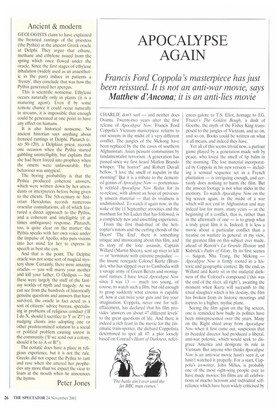Ancient & modern
GEOLOGISTS claim to have explained the frenzied rantings of the priestess (the Pythia) at the ancient Greek oracle at Delphi. They argue that ethane, methane and ethylene issued from the spring which once flowed under the oracle. Since the first stages of ethylene inhalation (widely used as an anaesthetic in the past) induce in patients a 'frenzy', they conclude that was how the Pythia generated her apergus.
This is scientific nonsense. Ethylene occurs naturally only in plants (it is a maturing agent). Even if by some remote chance it could occur naturally in streams, it is impossible that enough could be generated at one point to have any effect on humans.
It is also historical nonsense. No ancient historian says anything about frenzied rantings at Delphi. Plutarch (c. AD 50-120), a Delphian priest, records one occasion when the Pythia started gabbling unintelligibly, but explains that she had been forced into prophecy when the omens were unfavourable. Her behaviour was untypical.
The boring probability is that the Pythia produced coherent answers, which were written down by her attendants or interpreters before being given to the clients. The 5th-century BC historian Herodotus records numerous oracular consultations, all of which featured a direct approach to the Pythia, and a coherent and intelligible (if at times ambiguous) response. Plutarch, too, is quite clear on the matter: the Pythia speaks with her own voice under the impulse of Apollo, who puts visions into her mind for her to express in speech as best she can.
And that is the point. The Delphic oracle was not some sort of magical mystery show. Certainly, there were amazing oracles — you will marry your mother and kill your father. 0 Oedipus — but these were largely the stuff of the fantasy worlds of myth and tragedy. As we can see from the hundreds of historically genuine questions and answers that have survived, the oracle in fact acted as a sort of citizens' advice bureau, specialising in problems of religious conduct (If I do X, should I sacrifice to Y or Z?') or nudging clients into adopting one or other predetermined solution to a social or political problem causing unrest in the community (If we send out a colony, should it be to A or B?').
The ecstatic does have a place in religious experience, but it is not the rule. Greeks did not expect the Pythia to rant and rave when she uttered her prophecies any more than we expect the vicar to foam at the mouth when he announces
the hymns. Peter Jones


















































































 Previous page
Previous page